By Toyin Falola
I was privileged to listen to the two-hour-long Inaugural Address by Professor Olukoya Ogen, delivered at Osun State University on September 5, 2024. Certainly, because I enjoyed listening to it, I did not know when the time flew so fast. Titled “Reconstructing A Silenced Past: Echoes of Revisionism and Counter Hegemonic History,” it was an additional privilege to have also received the printed copy. This piece is a reflection on this lecture.
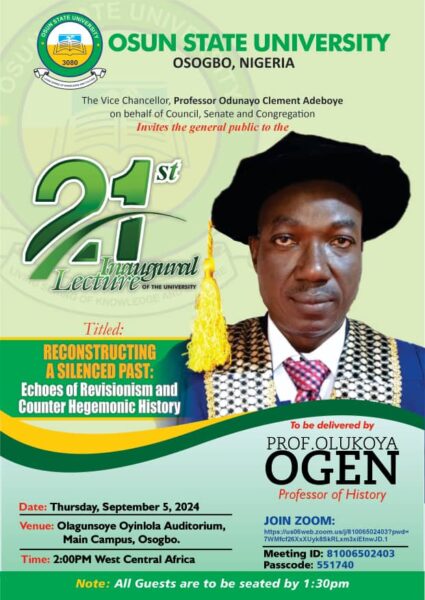
Imagine a past revered for a very long time, stories beloved without question, and cultural landmarks shaped in the shared memory of a people. Still, there is a hidden depth of invisible voices, whispered stories, and neglected truths not embraced. After years of research and a desire to update what we know about one of Africa’s most active civilizations, we can now tackle Yoruba historiography by revisiting and trying to redefine Yoruba civilization, thereby shifting our viewpoint, especially on the conventional wisdom guiding Yoruba history for many years. As Professor Olukoya Ogen argued, history, as we know it, is an issue of choosing who gets to give those facts and whose tales deserve representation, not merely of recalling facts. Part of this process is reevaluating current historical narratives and sometimes challenging the long-standing dominant narratives that have defined the intellectual and cultural surroundings of the Yoruba people. This shows that much of revisionist history is about expanding our knowledge by including many points of view that have been deliberately excluded instead of rewriting history with the aim of change.
The value of revisionist history transcends intellectual circles. It asks us to examine, probe, and embrace a legacy more complicated than one might find by combining the stories of people living on the outskirts of history. It is about healing and understanding, about giving voice to those without one, not merely about fixing historical errors. Hence, in this context, the goal is to change not only historical consciousness but also the Yoruba people’s own identity. Yoruba history has traditionally been studied from a perspective that emphasizes central and Western stories, sometimes overlooking the connection and complicated histories of the Southeastern part of Nigeria. This explains why revisiting our history is a necessity at this point. Revisionist history seeks to challenge the single-story approach by underlining the several complicated and diverse experiences inside Yoruba society that have been either ignored or directly discarded. It critiques the monolithic narratives produced by those in authority, the ones that regularly define what is remembered and forgotten, further helping to challenge conventional narratives, thereby arming the less powerful and offering the voiceless voice. Like many other civilizations, Yoruba history has been shaped mostly by colonial influences and post-colonial power structures—which normally favour some areas or dynasties over others. Revisionist history thus becomes quite crucial in trying to decolonize history by challenging these prejudices and supporting a more fair view of the past, ensuring that the wealth and diversity of Yoruba history will be valued, therefore raising knowledge of its cultural complexity and importance.
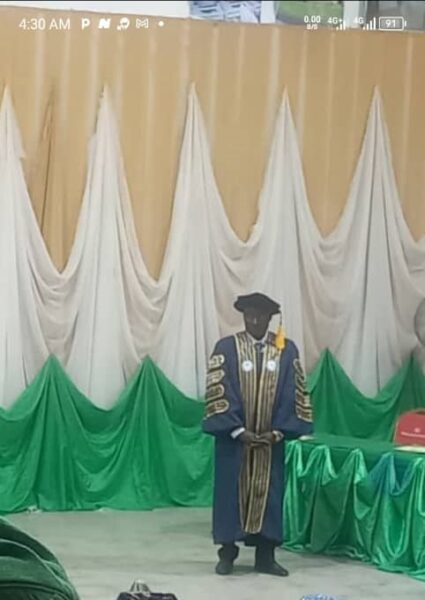
Further, inside the counter-hegemonic narratives, we find a potent tool for challenging and modifying the prevailing historical narratives that have long governed Yoruba historiography. Not only alternative stories but also counter-hegemonic narratives are essential corrections stressing the experiences and contributions of those communities and areas that have been methodically excluded from mainstream historical narratives. These present a more realistic picture of the past and progress, as well as a more general, more complicated knowledge of the cultural and social events inside the Yoruba community. Including the points of view of southeast Yoruba, for instance, helps historians to present a complete picture of the Yoruba culture, one that honours the achievements and experiences of all its component sections rather than merely the most politically or economically dominating. This is absolutely vital in a culture as diverse and scattered as the Yoruba, where different dialects, rituals, and historical events add to the shared inheritance.
Revisionist history and counter-hegemonic narratives are about fixing previous errors and ensuring that every person in society connects to the stories told about their beginnings. This knowledge helps to build community cohesiveness and identity since it respects the perspectives of those who have been left out of past national or cultural narratives. It also challenges the simplicity of conventional histories that occasionally ignore the complexity of social and historical events such as migration, intermarriage, and cultural interaction—basically fundamental to understanding the evolution of any society. With this, historians not only present a more democratic and inclusive account but also help to decolonize history by way of the viewpoint of people they have overlooked, striking away the layers of prejudice and discrimination set in colonial periods and continuing in post-colonial academic and cultural organizations.
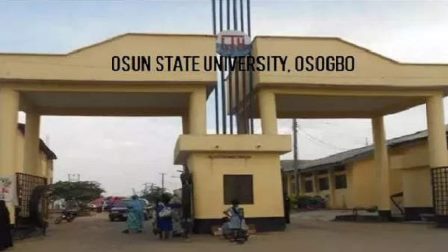
Key to achieving this are languages, anthropology, and ethnography, each of which presents a different prism through which the historical narrative of a people is seen. Linguistic studies, for instance, reveal migration patterns, cultural ties, and even social shifts inside various Yoruba sub-groups, therefore surpassing basic translation. Analyzing the variances in the Yoruba language and its variants would enable historians to understand historical movements and cultural convergences not noted in written records. Analogously, anthropology offers a whole picture of Yoruba social structures, rituals, and economic systems, therefore revealing how broader historical events shape and define these elements. Often necessary to understand the complete spectrum of their historical experience, this approach helps one to appreciate the Yoruba people’s sophisticated social rules and customs more. Modern images of Yoruba life presented by ethnography also enhance current understanding and methodologies. Ethnographers catch present cultural practices and beliefs by means of immersion fieldwork and participant observation, therefore offering insights into the continuity and spread of Yoruba culture. This real-time data, especially in places with little written records, helps one to grasp historical continuities and changes. Combining these several multidisciplinary approaches enables historians to show a more complete and fuller picture, therefore respecting the diversity and depth of Yoruba history. This approach criticizes the Eurocentric mythology that has long dominated African history and reveals the need for local knowledge systems and oral histories. Moreover, it guarantees that the histories of poor or less-documented groups are highlighted and democratizes the historical narrative, making it more accessible and appealing to a worldwide audience.
Along with distributing the historical knowledge sources, this more all-encompassing approach democratizes the historical production process itself. It forces readers to rethink what constitutes historical evidence and supports a more all-encompassing approach to event documentation. Thus, not only intellectual but also ethical duties of multidisciplinary approaches in Yoruba historiography aim towards a better and more equitable knowledge of the past.
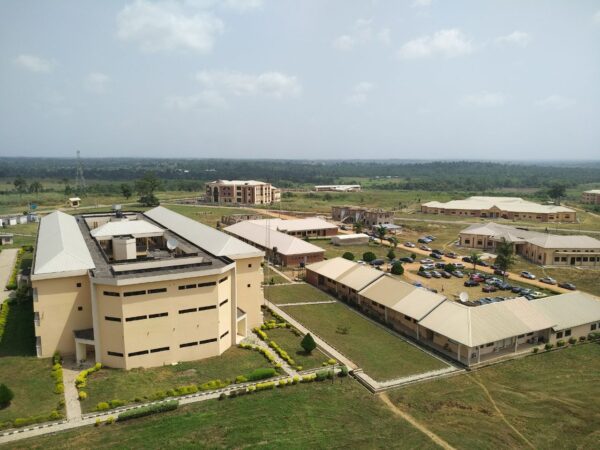
Building on the improved information offered by multidisciplinary approaches in revisionist history, the consequences of revisionist and counter-hegemonic narratives in Yoruba historiography extend well beyond scholarly circles. These narratives fundamentally alter the way history is taught and perceived, therefore influencing educational policies, cultural identity, and community cohesiveness. By offering a more complete history involving voices from all aspects of Yoruba society, these approaches question and widen the standard narratives that have periodically dominated national histories. Revisionist history courses, for instance, enable students to grow in the classroom in the value of cultural diversity and critical thinking. Students are invited to question the simplicity of conventional narratives and recognize the complex interaction among different factors in society that affect historical events by using an inclusive historical framework. A more knowledgeable and compassionate populace capable of interacting with the complexity of their history and those of others depends on this educational reform.
Moreover, the acceptance and inclusion of counter-hegemonic narratives help to eliminate the traces of colonial imprint on historical research. Through this decolonization of history, civilizations will be able to give a more fair and balanced picture of the past by transcending the weight of biased historical interpretations backing colonial values. It also acknowledges and aggregates the complexity and achievements of non-Western civilizations, therefore augmenting world historical knowledge. Politically, revisionist history benefits society, too. These narratives, which present a more complicated picture of the past, can direct government policies—especially those related to national unity, education, and cultural preservation. Policies developed by deep historical knowledge are more likely to be inclusive and fair, therefore reflecting the many demands and experiences of all sectors of existence. Thus, the adoption of revisionist and counter-hegemonic approaches in Yoruba historiography is not merely a scholarly one; they compel society to reflect on who they are, where they come from, and how every one of them could contribute to building a more inclusive future.
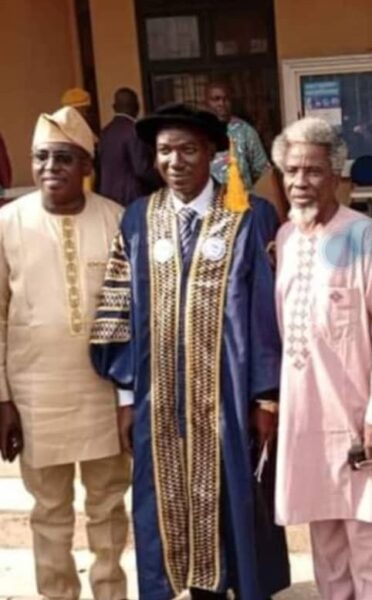
Legislators, historians, and the next generations of educators could find inspiration in this inclusive historical consciousness. By approaching history from a more inclusive and fair standpoint, these individuals can challenge out-of-date narratives and advance a better awareness of the complexity of human civilizations, therefore promoting more development. Encouragement of better respect and understanding among people from many backgrounds will have far-reaching effects on international events. By involving the public with this revised history, historical wounds can be healed, and problems left over by one-sided historical narratives can be resolved. A more inclusive and equitable viewpoint can serve to encourage communication and reconciliation in societies whose past has generated conflict. This is quite important in places like Yoruba, where several groups have to live and cooperate inside shared national borders.
Furthermore, the global consequences of adopting revisionist points of view cut beyond African or Yoruba history. Revisionist history offers a road map for reevaluating national histories all around as societies deal with the legacies of colonialism, imperialism, and racism. From this global reevaluation of history, a more linked and sympathetic society whereby the histories of every person are acknowledged and valued results. In Yoruba history, the adoption of revisionist and counter-hegemonic narratives ultimately moulds, most importantly, a more inclusive picture of the past. This approach not only clarifies our historical knowledge but also is really crucial for the construction of a fair society. As we keep testing and extending our historical narratives, we build a road towards a future when all points of view are heard and appreciated, and history acts as a bridge rather than a barrier between civilizations.
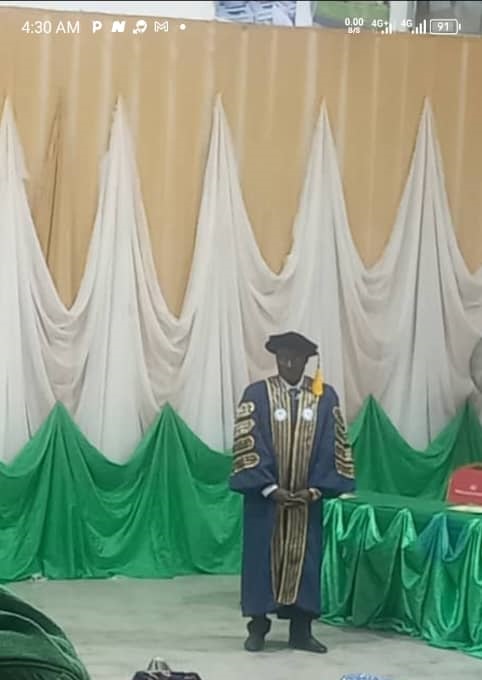
The above comments as given by the erudite historian, Professor Toying Falola has not only lend credence to the dire need to imbibe the great works now triggered by Revisionist Historian, Professor Olukoya Ogen, but presents a pragmatic relevance that now opens without barriers, a new area of interest which now confirms that there is no settled issues in history.
This is awesome and robustic submission sir.
The remark by the erudite Falola
Is consummate. Indeed we need to come to term with the realities and exigencies of time regarding historical process and development.. Revisionism in our context is essential and counter- hegemonic historical discourse is sinequanon. Congratulations on your successful inaugural my boss!
Excellently done. Prof Ogen has succeeded in igniting the scholarly thematic and fundamentally intriguing School of Historical Reconstruction and Documentation as captured by Prof Falola. Even “Angels (the supposed mighty and invincible historians) shall now thread more cautiously as Revisionism has come to stay to complicate the long held tradition of using micro-lens to speak for the Yoruba in general. History is a never ending dialogue and to awaken the silenced past, existing works must be re-examined, scrutinized and new evaluation provided for further complicated and expanded views of the existing views.